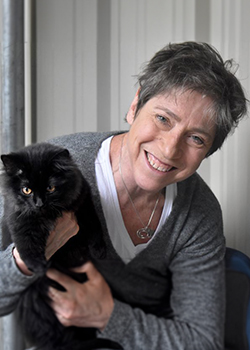by Margie Scherk, DVM, DABVP

Individualizing Care for the Cat with Diabetes – Do I Use Nutrition, Insulin, or SGLT2i?
What makes some with diabetes so challenging to manage? Which insulin and diet should we start with? What about oral therapies? What data is there to support these decisions? Is remission always the goal? Performing and interpreting glucose curves (manually or using a Flash device) provides useful information to determine best type of insulin as well as dose adjustments in a patient. However, performing curves isn’t appropriate for every client. When should we reach for an SGLT2i? How do we manage cats on an SGLT2i? The goals of therapy differ with different patients and different clients.
Obesity: Winning the Battle of the Bulge Takes More Than a Bag of Food
For weight loss to be beneficial, even 10% loss can help with energy, mobility and reduce the chance for the development of diabetes in cats. This lecture discusses aspects of weight loss and management that go beyond the diet and examines some thoughts about neuroendocrine implications of obesity. The keys to successful programs are providing education, support, and follow-up, not just a weight loss diet.
Dr. Detective: Solving the Challenge of Feeding the Multicat Home With Different Nutritional Needs
How does one logically approach feeding the multicat household in which different cats have differing nutritional requirements? We’ll review what is special about cats from a nutritional perspective and briefly review the rationale and evidence behind therapeutic diets. This session will give practitioners the tools to set about solving this challenge in a straight-forward fashion by determining which of the cats is most fragile nutritionally and how to use characteristics of different cats to facilitate tailored feeding.
Comorbidities: Managing the Unmanageable. How I Approach a Cat With CKD, Diabetes, Arthritis, Hyperthyroidism, and Hypertension
The older cat is predisposed to many medical problems and often presents with several concurrent disease conditions. We will look at managing a cat with chronic kidney disease, diabetes, hyperthyroidism, hypertension, dental disease, and arthritis.
Diseases of the Nasal Planum
The most notorious disease of the nasal planum in cats is squamous cell carcinoma, however there are numerous other non-neoplastic conditions to consider when presented with a cat with an ulcerated, erythematous, and crusty, swollen or even proliferative/nodular nose in this species. Nevertheless, a wide variety of diseases may present with similar clinical signs. This presentation will look at differentials, diagnostics, and possible therapies.
But My Indoor Cat Doesn’t Get Fleas or Ticks!” And Other Feline Myths
There are many beliefs about cats that are untrue. Many are about how best to care for cats (recognizing sickness, preventive health care needs of indoor housed cats, optimal age for spaying or castration, what to feed cats). Others are about the people they live with (how to feed cats, teaching cats, what purring means, pregnancy, and toxoplasmosis, changing client behavior).
Margie graduated from the Ontario Veterinary College in 1982. In 1986 she opened the third feline clinic in North America. She became a board-certified feline specialist the first year this specialty became available in 1995 and has maintained this certification. Since 2008, she has been a consultant and an educator speaking internationally and teaching on-line. She co-edited the Journal of Feline Medicine and Surgery for 23 years. Margie has served extensively in the American Association of Feline Practitioners as well as other veterinary organizations. Her interests include all things feline, especially enabling positive interactions with cats, analgesia, seeing an end to declawing, and the peculiarities of the feline digestive system.
6 hours available. The WSVMA is an approved source of Continuing Education in the State of Washington.
Included in your registration are scientific proceedings, snacks, beverages and lunch. While we try to accommodate dietary restriction, we cannot guaruntee them.
Scientific proceedings will be handed out at the CE event.
Cancellations received by January 15 will have $10 deducted for processing fees. There will be no refunds for no-shows who have not notified the WSVMA after January 16.
The WSVMA is committed to providing a safe and healthy facility for its and attendees. We will be following the most stringent policy required at the time the event is held and will also be following whichever rules may be put in place by the facility itself, the city of Bellevue, and/or the State of Washington. Accordingly, any of the current terms of service may be changed. Covid requirements can change rapidly, and we will endeavor to keep attendees, sponsors and exhibitors up to date to the best of our ability.
Questions surrounding this policy can be directed to the WSVMA office at [email protected] or by calling (425) 396-3191.
Washington State
Veterinary Medical Association
23515 NE Novelty Hill Rd.
STE B221-337
Redmond, WA 98053
Toll Free: (800) 399-7862
Phone: (425) 396-3191
Fax: (425) 396-3192
Ⓒ 2025 Washington State Veterinary Medical Association